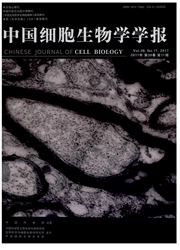

 中文摘要:
中文摘要:
生物钟是一种具有自主周期的时控装置,通过接受外界光照、温度、食物等信号刺激与环境保持同步.在哺乳动物中,食物信号是外周生物钟一个非常有效的时控因子.研究了大鼠心脏组织中生物钟基因Rev—erbα在正常情况下以及在光周期颠倒之后的表达变化规律.结果发现,正常情况下,心脏中Rev-erbα基因呈节律性表达;在光周期和饮食颠倒后,喂食富含蛋白质饲料组大鼠心脏中Rev—erbα基因的时相重置速度比喂食基础饲料组大鼠的更慢.因此,蛋白质类食物可能不利于机体适应外界时差的改变.
 英文摘要:
英文摘要:
Circadian clocks are autonomous time - keeping mechanisms that allow living organisms to predict and adapt to the environmental rhythms of light, temperature and food availability. In mammalian species, peripheral clocks can be strongly affected by daily feeding cycles. The present paper investigates the expression profiles of Reverbα in the heart of rats under normal circumstances, and the re - entrainment of Rev - erbα in rats fed with basic diet or protein - rich diet after a combination shift of feeding and light/dark cycle. The results suggest that the expression of Rev - erbα in the heart of the rats is rhythmic under normal circumstances, but after the reversal of both light and food, the process of phase resetting of Rev - erbα in the rats fed with protein - rich diet is slower than that of the rats fed with basic diet. Thus, it concludes that the protein - rich diet may not help to facilitate an adjustment of the peripheral clock system to new environmental conditions.
 同期刊论文项目
同期刊论文项目
 同项目期刊论文
同项目期刊论文
 Resetting Process of Peripheral Circadian Gene Expression after the Combined Reversal of Feeding Sch
Resetting Process of Peripheral Circadian Gene Expression after the Combined Reversal of Feeding Sch Differential Roles of Breakfast and Supper in Rats of a Daily Three-Meal Schedule Upon Circadian Reg
Differential Roles of Breakfast and Supper in Rats of a Daily Three-Meal Schedule Upon Circadian Reg FEEDING-INDUCED RAPID RESETTING OF THE HEPATIC CIRCADIAN CLOCK IS ASSOCIATED WITH ACUTE INDUCTION OF
FEEDING-INDUCED RAPID RESETTING OF THE HEPATIC CIRCADIAN CLOCK IS ASSOCIATED WITH ACUTE INDUCTION OF 期刊信息
期刊信息
